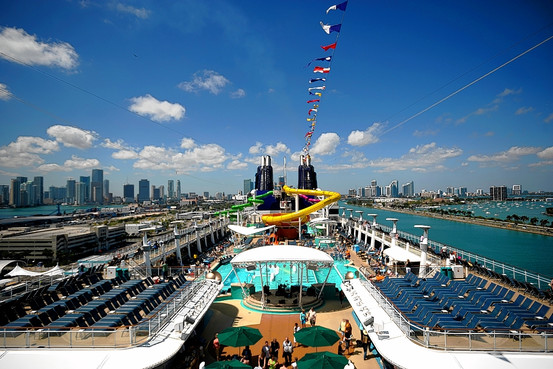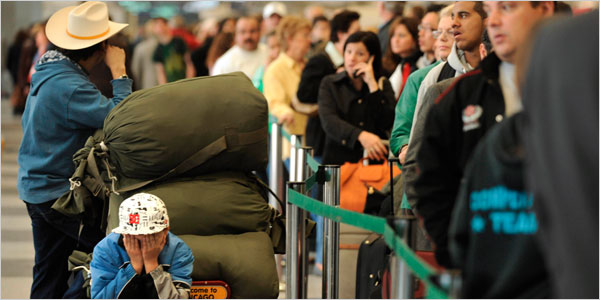Return of the Class System – Concierge Everything
Cruise lines are the latest to create separate enclaves for customers willing to pay more to escape the riffraff.
Wall Street Journal lured me in with the headline “The Return of the Class System.” But it’s a story about one microcosm, the offering of premium services on cruise lines for a hefty upcharge.
There is a new cruise ship class system. A growing number of cruise lines have built lavish—and separate—cocoons for their biggest spenders. It is a departure from the egalitarianism that had reigned on most ships for the last several decades when everyone from the humblest inside stateroom to the most luxurious suite would rub elbows in the same bars, dining rooms and pool decks. In a way, the trend is a throwback to the heyday of trans-Atlantic crossings in the 1920s, when first-, second- and third-class passengers were assigned separate areas of vessels.
[…]
Like first-class airline passengers, guests staying in the private complexes pay premiums for their perks. Depending upon the time of year, a three- or four-night cruise to the Bahamas on the Disney Dream, for example, costs $439 per person double occupancy in a regular stateroom with balcony. A balcony room on the concierge level is $2,159 per person.
While cruise lines must invest in the extra amenities and staff, these guests also tend to spend more when they’re onboard.
Royal Caribbean began what it calls its “suite enhancement program” two years ago after it noticed that guests staying in suites were giving their staterooms high marks in guest feedback surveys, but were rating the overall cruise less favorably than other passengers. Focus groups showed that these high-end guests “weren’t feeling like they were special when they left their suite,” says Lisa Bauer, senior vice president of hotel operations for Royal Caribbean International. The top amenity the guests wanted was separate spaces reserved for them alone. So the brand added private pool-deck areas, reserved seating at the theaters, private cocktail parties with the ships’ captains and priority boarding and disembarking. “The ratings soared,” Ms. Bauer says.
A major perk of being a ship-within-a-ship guest is getting to skip the lines.
[…]
On a Saturday earlier this month, the difference between the main pool and the one in the Courtyard Villa was striking. In the main area, a reggae band played loudly—with frequent interruptions from high-decibel ship announcements—while squealing children played in the sprinklers. In the Courtyard area, a dozen or so guests reclined in near silence. Regular guests do have access to a less-frenzied adults-only pool. Courtyard Villa guests also get first dibs on restaurant reservations, shore excursion reservations, spa treatment slots and seats at the various shows. While regular passengers line up at a theater’s closed doors, a butler escorts suite guests through a back entrance to their seats.
I’m shocked that it’s taken cruise lines this long to adopt an obvious program. After all, airlines, hotels, and even children’s theme parks have been doing this sort of thing for years.
More affluent customers are simply harder to satisfy. They’re used to more expensive restaurants, first class accommodations, and personal service. So, when cruise lines were charging them a premium price for a nicer room but offering them no additional perks, they were naturally going to be less satisfied than customers paying rock bottom prices and thrilled at the prospect of free shrimp. Things that are a rare treat for working class consumers are likely hum drum, if not sub-par, for people accustomed to luxury.
I fully expect the “class system” concept to become much more widespread. The article notes that prices in the cruise industry have been essentially frozen since the late 1980s because of over-saturation in the marketplace. So, it just makes sense to convert as many spaces as the market will bear into luxury billets–especially if they go for nearly five times the price. Presumably, the next step will be to create intermediate service levels, allowing people who can’t afford or don’t desire all of the perks but would like, say, a semi-private pool to customize their experience.
Far more disturbing to me than the notion that the rich should be able to spend more for lavish treatment is this:
In addition to ship-within-a-ship spaces, companies have tried to coax passengers to spend more by adding a slew of specialty restaurants that require patrons to pay an extra fee above their cruise fare. On Celebrity Cruises’ newest Solstice class of ships, for example, there are five specialty restaurants with extra fees from $5 to $35 per person and just four that are included with the cruise fare. Disney’s Remy, onboard the Dream, has set an industry record by charging an extra $75 per person (plus an additional $99 if you want the wine pairings) for an eight- or nine-course meal.
While aerobics and body sculpting classes are free on Celebrity ships, yoga and Pilates classes cost an extra $10 per session. Extra fees have even crept into the main dining room. On some Royal Caribbean ships, a basic Black Angus steak is free. A filet mignon is $14.95 extra.
Passengers can still have a relatively all-inclusive vacation by sticking to the free dining rooms and shows (and not drinking alcohol, soda or lattes). The difference now is that the temptation to rack up a bigger tab is at nearly every turn. It’s easy for a neophyte cruiser to end up with a huge bill at check-out, one that could even surpass the price tag of the cruise itself.
The practice of nickel-and-diming everything, charging fees for things that were once included and expected as part of the service–and the constant hectoring for upcharges–is annoying and, in many cases, borderline unethical. If a coach-level cruise is $439 and the concierge-level one is $2,159 per person, with a list of included services listed alongside each, there’s tremendous transparency allowing customers to make a rational decision up front.
But if the $439 rate is advertised as including everything but alcoholic beverages and then it turns out that there’s an upcharge for a decent steak or to eat in five out of the nine restaurants–oh, and it’s $6 if your kid wants a Coke and $3 for a towel and $6 to rent a chair for the day–then cost-conscious customers are basically trapped into either spending their vacation scrimping or being hijacked into spending far more than they’d been led to believe.
I’ve got no problem with a class system. But I want a system with class.







We know what a deeply class divided system looks like in the US. We had one in the Robber Baron days. We know what a deeply class divided system looks like in the rest of the world – India, Columbia, China, etc. The belief that the free market system ‘left to itself’ (not sure what that would even look like – anarchy?) will result in a fair and equitable system is contravened by reality a hundred times over. Yet the conservatives such as yourself, who are willing to tackle this head on, really have no vehicle to achieve your ends. All of the Republican party (and a good portion, although not all, of the Democratic), is so beholden to the upper class they see themselves as heroes rather than boot lickers. And any conservative politician that wants to deal with these issues by working with Democrats, at least in the Federal and most of the State systems, would have to become a Democrat because they would be completely ostracized by their party, its financial backers, and its Christian base, leading to a defeat at the next election.
It’s not a class system, it’s a pay-for-what-you-get system.
Back in the 90’s when the kids were of the age to enjoy it, we would use the “private guides” on trips to Disney World. Available through the concierge at the higher end Disney resorts, these guides would take a family through the back door of all the attractions, bypassing the (“one hour from this point”) serpentine lines. Not only did they get you right in, they would put you in the best seat on the ride.
They would also get you in to the theme restaurants at a moment’s notice, had a special spot for viewing the parades and would put the kids in as “cast members” in the shows, like the Indiana Jones attraction. Guides would expand on the regular tours through the studio and spend as much time as you wanted at any location. Each trip was thoroughly enjoyable and well worth every penny of additional cost.
Anyone willing to spend the money was welcome to use the service. In a capitalist system, it is exactly how it should work.
jwest –
Disney’s private guide service is more akin to the premium service levels on cruise ships, rather than the ships’ practice of charging all passengers extra for things that used to be included in the all-inclusive price.
Why begrudge someone his or her station in life? You’ll just wind up a bitter old fart alone and with an empty soul.
I don’t begrudge people at top a damn thing. If I had the money to pay for it on vacation, I’d pay premiums for better service, too. A few hundred or a thousand extra for a bigger room, a private butler, and a private pool are fine little premiums. But nickel-and-diming people is just annoying. I’m looking at YOU, airlines with your checked bag fees.
Drawing allusions from a “class system” based upon buying a level of service to a Marxist class system in the economic/political/social sphere is quite silly.
Well, I guess the social-democracy is truly dying. Not only are the entitlement programs revealed as unsustainable but even the egalitarian service has given way to the old class system. Didn’t even make it 100 years. A flash in the pan even in US history.
I see the benefit of the concierge system to attract more high paying customers but cruise ships aren’t like hotels where such service is in the open but generally unseen. On airlines the advantages are keep behind the curtain. Everyday, in every way, this will be in the basic package cruise customers’ faces. And look, to make it special, they are going to remind them of their station at every turn. Offering a better inclusive package is one thing but the basic cruise package with extra charges if you want a pillow is a bit turning the screw. It should be interesting to see if cruising for the non-well-to-do falls off and whether the margins on the concierge customers are high enough to keep the screws turning. Empty cabins on the steerage deck doesn’t really reduce the fixed costs necessary to keep the ship moving.
“More affluent customers are simply harder to satisfy. They’re used to more expensive restaurants, first class accommodations, and personal service. ”
I think its more about vanilla snobbery.
The “Premium” passengers would probably settle for getting to wear a button that says “I’m Special.”
Based on the article, it may be time to take a cruise.
As long as the door to steerage is well-bolted and a separate boarding area is provided so that one doesn’t need to step over and around the passengers who bring their spandex cruise wear onboard in a pillowcase, it might be fun.
It’s clear that some of the cruise lines are advertising rates that are far too low for even an economy trip. I’ve witnessed people coming off ships in the Caribbean that could eat their weight in shrimp and short ribs at a buffet, who would surely cost more to feed for a week than what was charged for the cruise.
Put me in the camp that’s more annoyed by the Nickel-and-Diming than rich people having private accommodations on a cruise ship (although one wonders why they can’t just have a pricier cruise ship overall).
That said, I’m not that annoyed, provided that they inform you that they’re going to nickel-and-dime you first. I remember going on one of the Disney Cruises with family members, and they made sure that you knew that the alcohol, drinks, and certain restaurants required you to spend money above whatever you paid for as part of the cruise package.
Does the name Thorstein Veblen ring a bell?
To add-
Are there enough rich passengers that they could simply have a Rich People Cruise Ship? You’d think the rich would love that, since it would be a chance to hobnob and hang out with other wealthy people.
Brett #2 — There are indeed such things as “Rich People Cruise Ships” — lines like Silverseas specialize in small ships with high end amenities and big price tags. The “rich people” areas on Carnival cruises are for wannabees who are desperate to be able to look down on someone, but can’t really afford to hang with the big kids.
Brett,
The better marketing strategy is to do the exact opposite of what you suggest.
Instead of cruises composed totally of rich people, it would be better to have ships that have average people in regular cabins and third-world passengers in steerage. That way, the people eating in the normal buffets could feel superior to those being spooned gruel on the lower decks. A crowded swimming pool would seem luxurious if the passengers could peer over a rail and watch the third-world folks washing in buckets.
Think of it as a “feel like you’re rich” cruise experience.
The problems with nickel-and-diming, whether it’s cruise ships or airlines or anything else, are:
1) It’s rarely clear what the costs will be up front. Even if you knew you would be nickle-and-dimed, good luck finding enough information to estimate how much you will spend.
2) As James points out, spending the whole vacation scrimping doesn’t make for a very enjoyable vacation. The kids ask for a drink. ” Oh, it looks like we’re going over budget. Sorry about your vacation, kid.” I’d much rather have something be all-inclusive, pay up front, and then DO WHAT I WANT.
Of course, the dirty little secret is in the event of an emergency that concierge service goes out the window. And I don’t mean everyone treated equal. There have been several ships that have gotten into trouble only to have the passengers abandoned by their third-country-national crew, sometimes even to the captain. One off South Africa comes to mind. (third-country-national crew – not the same nationality as the ship’s flag state, which is often different than the Western nationality of the officers or hotel staff)
Not really sure where I see this as an issue. You pay, you get. Old story. When I go to a baseball game, I prefer to sit on the Club Level. I don’t think that makes me a snob, it’s just a better experience.
JKB,
Most rich people are well versed enough in the ways of the world to know that in an emergency, you immediately find the highest ranking or largest crew member and put him on your personal payroll.
You want someone who can stock enough caviar on the lifeboat so that watching the ship sink from afar isn’t unpleasant.
The funny thing is that there aren’t (or shouldn’t*) be any poor people on cruise ships. This becomes “the affluent divided, film at 11.”
* – some lines run promotions for credit card purchasers, which is fairly evil and/or tragic
anjin-san,
I always suspected you of being born into the bourgeoisie, sitting in the club level.
That was my bad – I noticed it on my re-read of the WSJ article.
Cruise ships aren’t that expensive. The Disney Dream example had a per-cabin price for a regular stateroom at $439 per person. It’s pricy, but not that pricy considering how rarely people go on cruises (once every few years).
At some point, you’re rich enough to just charter (or buy) a yacht.
I have to say, seeing the number of empty seats behind the plate on t.v. this p.m. at the Nationals opener, it seems like the real benefit of club seats is (a) increased likelihood that the seat next to you will be vacant and (b) the person paying for the seat probably has an “Inc.” in it’s name.
Building on what PD Shaw says immediately above, I grew up in Chicago in the Ditka years and then lived near Buffalo during the infamous four-trips-to-the-Superbowl-with-no-wins era. So I thought I knew what a sporting event was supposed to be like. I then moved to Atlanta, and went to a Falcons game, a couple of Braves games, and a basketball game (what the heck is the name of that team?). What an awful experience. Most of the seats were company seats, and most of them were occupied by transplants. If Atlanta was winning, hey, okay, but if they were losing, hey they are probably losing to a team that’s from near where I grew up, so hey, that’s OK too. Then I moved to B-More and became an Orioles fan during the Cal Ripken years. What a great stadium! What great fans! Then I moved to the NYC area and had a couple of kids. Great, I said to myself, I’ll be able to take the kids to a Giants game or the Mets or the Yankees. I went with some co-workers to a Mets came to check it out. What a bunch of drunken obnoxious jerks. When I commented that in Baltimore people like that would be kicked out, someone commented – “Not if they paid $8000 bucks just for the privilege of buying seasons tickets.” Instead I ended up taking my kids to professional soccer games, where the fans were intense but well behaved.